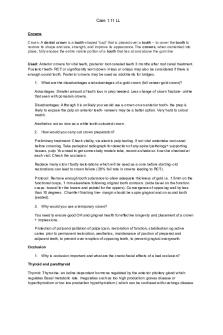Lesley Stower Fine Foods Case Response PDF

| Title | Lesley Stower Fine Foods Case Response |
|---|---|
| Author | Simran Goraya |
| Course | Information Technology for Business |
| Institution | Kwantlen Polytechnic University |
| Pages | 2 |
| File Size | 63.4 KB |
| File Type | |
| Total Downloads | 30 |
| Total Views | 151 |
Summary
Repose to case assignment,...
Description
Case Summery LSFF was founded in Vancouver, Canada, in 1990. The chief reason for its establishment was that the owner Leslie Stowe was dissatisfied with the city’s offering specialty foods. The company started of by offering premium catering, classes, and speciality grocery products. In the early 2000s, with the new crackers Raincoast Crisps product and its immediate success began a 10 year run of growth for the company. After the initial offering of the cracker the company transitioned from a food service into a production company with the crackers being its main emphasis. LSFF needs exceeded its production capacity in 2010 and moved into a medium size plant. Currently the Raincoast Crisps are sold in 4,000 stores within North America. With the constent growth of the company for over a decade, LSFF has come up with a new decision strategy and need to choose a new ERP system. The company had met with eight request for proposals and met with five of them. Two of them stood out and the decision was to be made between which was more suitable to the company. It was going to be either Barnes and Co. – Sage ERP X3 or The Underwood Group – Microsoft Dynamics NAV. The two proposals that are being considered are greatly different in price. Barnes and Co. is $51,600 for implementation and $20,630 for software licence. The Underwood Group is $116,200 to implement and $25,973.40 in software licence. In order for Lesley Stowe Fine Food’s (LSFF) to continue having success they must choose an ERP system that best meets the companies needs of the present and the future and make a decision with support from her team within the immediate future. Current Issues At present management is pressured with time constraints due to LSFF’s increasing growth at a rate that they can not currently handle. Management is being spread too thin resulting in ineffective communication between managers, as opposed to excellent communication LSFF had when it was a small business. This is not being helped by having managers spend eight to ten hours compiling monthly. The current software as a service ERP system was not sufficient enough to comprehend LSFF’s tasks. This was compounded by the fact that the vendors offered inadequate support resulting in manual files instead. Recommendation – Based on a cost analysis we would choose Barnes and Co. as the new ERP. It is also justified in being the right choice for this company as it is ideally suited with its ease of use and specified towards companies of the same size as LSFF. Also, a negative for The Underwood Group was not following the proposal template set out which shows they do not follow instructions well enough or do not consider our needs as priority.
What we learned from the case ● That a company’s growth can exceed its current ERP system and will require an expansion. ● The expansion should occur sooner rather than after it becomes a necessity. ● Not all companies are able to follow a proposal list of requirements and would rather fill in any missing details with a presentation. ● How much time and productivity is wasted due to an inefficient ERP system. ● Importance of being able to outline the risks of growth for the future, which is minimize the urgency and issue of finding a new system immediately. This causes stress not only on the management but on the company as well....
Similar Free PDFs

1.11 Lesley Lewis- Full case
- 2 Pages

Diamond Foods CASE Analysis
- 4 Pages

Case 1: Kraft Foods Case Study
- 5 Pages

Lesley Jeffries
- 5 Pages

Case study response essay.
- 7 Pages

Wolfgang Keller Case Response
- 2 Pages

Case Whole Foods Market Inc 2009
- 18 Pages

Whole foods case study real-2
- 8 Pages

Ford pinto case reading response
- 3 Pages

Lesley Dela Cruz Cleaners
- 6 Pages

Impossible Foods Report
- 17 Pages
Popular Institutions
- Tinajero National High School - Annex
- Politeknik Caltex Riau
- Yokohama City University
- SGT University
- University of Al-Qadisiyah
- Divine Word College of Vigan
- Techniek College Rotterdam
- Universidade de Santiago
- Universiti Teknologi MARA Cawangan Johor Kampus Pasir Gudang
- Poltekkes Kemenkes Yogyakarta
- Baguio City National High School
- Colegio san marcos
- preparatoria uno
- Centro de Bachillerato Tecnológico Industrial y de Servicios No. 107
- Dalian Maritime University
- Quang Trung Secondary School
- Colegio Tecnológico en Informática
- Corporación Regional de Educación Superior
- Grupo CEDVA
- Dar Al Uloom University
- Centro de Estudios Preuniversitarios de la Universidad Nacional de Ingeniería
- 上智大学
- Aakash International School, Nuna Majara
- San Felipe Neri Catholic School
- Kang Chiao International School - New Taipei City
- Misamis Occidental National High School
- Institución Educativa Escuela Normal Juan Ladrilleros
- Kolehiyo ng Pantukan
- Batanes State College
- Instituto Continental
- Sekolah Menengah Kejuruan Kesehatan Kaltara (Tarakan)
- Colegio de La Inmaculada Concepcion - Cebu




